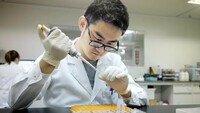Genetic testing
Product Quick Detail
- FOB Price
- USD $100.00 / Piece
- Minimum Order
- 1
- Place Of Origin
- Shenzhen
- Packaging
- N/A
- Delivery
- 15 Days
Specifications
Review
Hereditary screening involves analyzing your DNA, the chemical data source that carries instructions for your body's features. Genetic screening can expose modifications (anomalies) in your genes
that may trigger ailment or condition.
Although genetic screening can supply important information for identifying, dealing with and stopping health problem, there are restrictions. For instance, if you're a healthy and balanced
person, a favorable arise from genetic testing doesn't always mean you will develop a condition. On the other hand, in some situations, an unfavorable result doesn't assure that you won't have a
specific problem.
Talking to your doctor, a medical geneticist or a hereditary therapist regarding what you will finish with the results is an important step in the process of hereditary screening.
Genome sequencing
When hereditary testing does not lead to a diagnosis however a genetic cause is still suspected, some facilities offer genome sequencing-- a process for assessing a sample of DNA extracted from
your blood.
Risks
Usually genetic tests have little physical danger. Blood as well as cheek swab tests have almost no risk. Nonetheless, prenatal testing such as amniocentesis or chorionic villus sampling has a
small risk of maternity loss (miscarriage).
Hereditary screening can have emotional, social and also financial dangers too. Review all dangers and benefits of hereditary screening with your medical professional, a medical geneticist or a
hereditary counselor prior to you have a hereditary test.
Exactly how you prepare
Prior to you have hereditary screening, gather as much details as you can about your family's medical history. After that, talk with your doctor or a hereditary counselor concerning your personal
as well as household medical history to much better recognize your danger. Ask inquiries and discuss any type of concerns about genetic testing at that meeting. Likewise, speak about your options,
depending on the examination results.
If you're being tested for a genetic disorder that runs in households, you may want to take into consideration reviewing your decision to have hereditary screening with your family members. Having
these discussions prior to testing can give you a sense of how your household could react to your test results and just how it may influence them.
Not all medical insurance policies spend for hereditary screening. So, before you have a hereditary examination, talk to your insurance policy supplier to see what will certainly be covered.
In the United States, the government Genetic Info Nondiscrimination Act of 2008 (GINA) aids prevent health insurance firms or employers from discriminating against you based on examination results.
Under GINA, work discrimination based on hereditary risk likewise is unlawful. However, this act does not cover life, long-lasting treatment or disability insurance. Many states offer extra
protection.
What you can anticipate
Relying on the sort of test, an example of your blood, skin, amniotic fluid or other tissue will be accumulated as well as sent to a laboratory for analysis.
Blood sample. A participant of your health care group takes the sample by inserting a needle into a capillary in your arm. For newborn screening tests, a blood sample is taken by puncturing your
baby's heel.
Cheek swab. For some examinations, a swab sample from the within your cheek is accumulated for hereditary screening.
In addition, you might select to join study or registries associated with your genetic disorder or condition. These alternatives might aid you stay updated with new growths in avoidance or
treatment.
Negative outcomes
A negative result means an altered genetics was not spotted by the test, which can be guaranteeing, yet it's not an one hundred percent assurance that you do not have the disorder. The accuracy of
genetic tests to detect altered genetics varies, depending on the condition being examined for and whether or not the genetics mutation was previously recognized in a relative.
Even if you do not have actually the altered genetics, that doesn't always mean you'll never ever obtain the illness. As an example, the majority of individuals that create bust cancer don't
have a bust cancer cells genetics (BRCA1 or BRCA2). Likewise, genetic testing may not have the ability to detect all genetic defects.
Undetermined results
In some cases, a genetic examination might not offer helpful info about the genetics in question. Everyone has variations in the way genetics appear, as well as frequently these variations don't
affect your wellness. However occasionally it can be hard to compare a disease-causing genetics and a safe genetics variation. These changes are called variants of unsure relevance. In these
situations, follow-up screening or periodic testimonials of the genetics in time might be essential.
Genetic counseling
No matter what the outcomes of your hereditary screening, talk with your medical professional, medical geneticist or hereditary therapist regarding questions or issues you might have. This will
certainly assist you understand what the results imply for you and also your household.
In most cases, some disease(like cancer) cannot be avoided, but it can be prevented. BGI gene test examines related genes to determine if you have a genetic variant linked to the disease in your
family, so that you can take preventive measures.
If you have no family history of the disease, but are concerned about your risk of it, other cardiovascular diseases, or you have an interest in multifactorial diseases, we also offer other
products. Please be assured that at BGI China, you will always have a consultation with one of our genetic counsellors, who will explain the test, what you can expect from the results, and answer
any additional questions you may have. Contact us for more information.
- Contact: Tommy Ru










